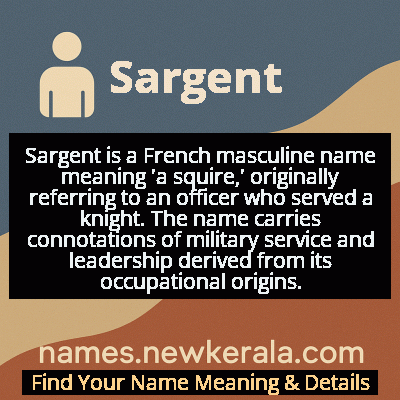Sargent Name Meaning & Details
Origin, Popularity, Numerology Analysis & Name Meaning of Sargent
Discover the origin, meaning, and cultural significance of the name SARGENT. Delve into its historical roots and explore the lasting impact it has had on communities and traditions.
Name
Sargent
Gender
Male
Origin
French
Lucky Number
3
Meaning of the Name - Sargent
Sargent is a French masculine name meaning 'a squire,' originally referring to an officer who served a knight. The name carries connotations of military service and leadership derived from its occupational origins.
Sargent - Complete Numerology Analysis
Your Numerology Number
Based on Pythagorean Numerology System
Ruling Planet
Jupiter
Positive Nature
Optimistic, inspirational, and creative.
Negative Traits
Scattered, exaggerating.
Lucky Colours
Yellow, gold, purple.
Lucky Days
Thursday.
Lucky Stones
Yellow sapphire.
Harmony Numbers
1, 2, 9.
Best Suited Professions
Arts, writing, communication.
What People Like About You
Creativity, optimism.
Famous People Named Sargent
John Singer Sargent
Artist
Celebrated portrait painter of the Edwardian era, known for his remarkable technical skill and psychological depth in portraits
Malik Sargent
Athlete
NFL running back who played for multiple teams including the Atlanta Falcons and Cleveland Browns
Dick Sargent
Actor
Television actor famous for his role as the second Darrin Stephens on the classic sitcom 'Bewitched'
William Sargent
Military Officer
British military commander during the American Revolution, known for his service in various colonial campaigns
Name Variations & International Equivalents
Click on blue names to explore their detailed meanings. Gray names with will be available soon.
Cultural & Historical Significance
Extended Personality Analysis
The name Sargent typically evokes personality traits associated with leadership, reliability, and structured thinking. Individuals with this name are often perceived as natural organizers who excel in situations requiring clear hierarchy and defined responsibilities. The military origins of the name contribute to expectations of discipline, punctuality, and a strong work ethic. These individuals may demonstrate protective instincts toward those in their care and show remarkable loyalty in personal and professional relationships. The historical connection to squires suggests someone who understands the importance of supporting roles and can work effectively as part of a team, while the officer connotations indicate an ability to take command when necessary. This creates a balanced personality capable of both following and leading. The name also suggests practical problem-solving skills and a preference for clear, actionable plans over abstract theorizing. While potentially perceived as traditional or conservative in their approaches, those named Sargent often possess the quiet confidence that comes from competence and experience rather than arrogance.
Modern Usage & Popularity
In contemporary naming practices, Sargent maintains a niche but respected position as a distinctive masculine name. Its usage has remained relatively stable but uncommon, avoiding both extreme popularity and complete obscurity. The name appeals particularly to parents seeking strong, historical names with military associations without being overtly militant. Recent decades have seen increased interest in surname-style first names and occupational names, which has helped sustain Sargent's usage. It's often chosen by families with military backgrounds, those appreciating its authoritative sound, or parents looking for a name that stands out without being invented or trendy. The name works well in professional contexts, conveying seriousness and capability. While not among the top names in any English-speaking country, its consistent usage across generations demonstrates enduring appeal. Modern bearers of the name often appreciate its distinctive quality and the historical depth it provides without the burden of excessive popularity or contemporary associations.
Symbolic & Spiritual Meanings
Symbolically, Sargent represents the bridge between service and command, embodying the idea that true leadership understands and respects all levels of an organization. The name carries metaphorical weight as a representation of structured authority—not as domineering power but as responsible stewardship. It symbolizes the medieval ideal of the loyal retainer who serves with honor while potentially rising to positions of greater responsibility. The military associations evoke concepts of protection, order, and disciplined action. Metaphorically, the name suggests someone who can navigate social hierarchies with grace, understanding both how to follow and how to lead. It represents the principle that authority is earned through service and competence rather than inherited or seized. The symbolic meaning extends to concepts of guardianship, where the individual serves as a protector of people, principles, or institutions. This creates a rich symbolic profile that balances strength with service, authority with responsibility, and individual capability with communal obligation.

